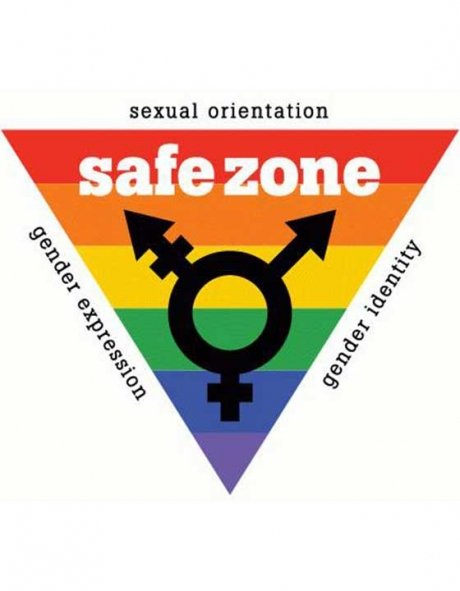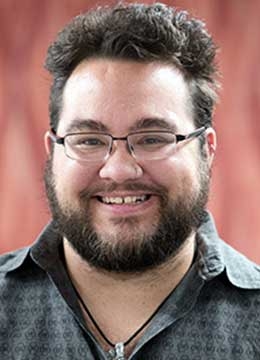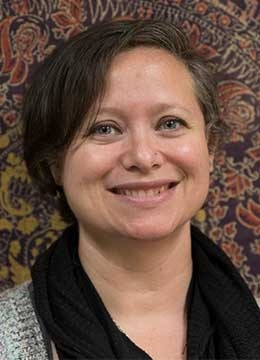Campus-Wide Safe Zone Trainings Promote Inclusive Excellence
- News & Events
- News
- Campus-Wide Safe Zone Trainings Promote Inclusive Excellence

Safe Zone is a campus-wide training program designed to create a nonjudgmental, safe, welcoming and inclusive environment for members of the lesbian, gay, bisexual, transgender and queer (LGBTQ+) community.
Three trainings were held this spring, led by the college’s new LGBTQ+ Coordinator Chris Susi and RIC Assistant Professor of Mental Health Counseling Michelle Kay Crossley, with additional trainings scheduled for the fall.
Safe Zone trainings expose hidden biases and misconceptions even among those who consider themselves open to differences. They are specifically designed to clear up misconceptions and provide a space where faculty, staff and students can talk, learn and ask questions about sexuality and gender.
RIC President Frank D. Sánchez, who dropped in on one of the trainings, reflected on his first Safe Zone training in 1997 at the University of Wyoming. This was within nine months after Matthew Shepard was murdered, he said. Shepard was a gay student at the university, who was beaten, tortured and left to die. His murder was believed to have been motivated by anti-gay sentiment. “I was part of the emergency response team at the university when the murder occurred,” he said.
“One of the most important things we can do at Rhode Island College,” Sánchez said, “is to create a sense of connection, belonging and ownership by every community member who steps onto this campus.”
To that end, the president’s first directive to RIC’s new Associate Vice President for Community, Equity and Diversity Anna Cano Morales was to hire an LGBTQ+ coordinator for the campus.

Susi, who identifies as transgender, was brought on board in August 2017. He is a two-time RIC alum, with a B.A. degree in gender and women’s studies and an individualized M.A. degree in history. For his thesis, he examined the LGBTQ+ and black historical protest movements.
Susi noted that these are the first Safe Zone trainings RIC has had since he was an undergraduate senior. “Students, faculty and staff are asking for LGBTQ+ programming, support and education, which directly impacts recruitment and retention,” he said.
During the trainings, Susi and Crossley explained LGBTQ+-related terminology and definitions, emphasizing the importance of language in creating an affirming environment for LGBTQ+ individuals. The term “homosexual,” for instance, is considered a derogatory term that originated in the field of psychology to describe a mental health disorder.

Susi and Crossley also summarized gay history and the ongoing struggle to secure equal rights for the LGBTQ+ community. No federal law exists that explicitly protects against LGBTQ+ discrimination, which leaves states open to decide if they want to include sex, gender, gender identity and expression, and sexual orientation in their nondiscrimination policies.
Participants brainstormed the ways in which RIC’s campus can become more inclusive and foster healthy dialogue on LGBTQ+ issues, particularly in the classroom.
“The current social and political climate is pushing these conversations into every aspect of our students’ lives,” Susi said. “I’m hearing from faculty and staff that students are raising these conversations in the classroom and faculty and staff are scrambling to keep up either with their own knowledge or how to put out fires when things get heated. One of my goals is to make sure that people are a little more equipped to have these discussions.”
Crossley added, “And there is no textbook way to relate to LGBTQ+ individuals.” Crossley has a private counseling practice in which many of her clients are trans. She said, “Everyone who identifies with a racial, ethnic, gender identity or sexual orientation doesn’t necessarily follow suit with that group. The goal is to be open to learning and asking questions both in class and outside of class.”
Upon conclusion of the training, participants were given Safe Zone stickers for display purposes. The stickers indicate that the individual has gone through the training and is supportive of LGBTQ+ individuals.
“The fact that these trainings are called Safe Zone, however, shouldn’t imply that there are some parts of the campus that are not safe,” said RIC’s vice president for community, equity and diversity. “Our collective work is to strive to ensure that the entire campus is a safe zone. These trainings and the staff appointment of an LGBTQ+ office are action steps being taken by the administration to ensure that all our students feel safe and included.”
Safe Zone trainings were created by the Safe Zone Project, a free online resource for creating powerful, effective LGBTQ+ awareness and ally training workshops.
